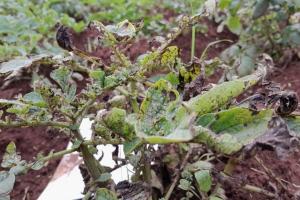 Blight-infested crop at Kalro-Marindas in Nakuru County/KALRO
Blight-infested crop at Kalro-Marindas in Nakuru County/KALRO The National Environment Management Authority has invited views on the proposed commercial cultivation of a genetically modified Irish potato that is resistant to late blight, a major crop disease responsible for billions in losses annually.
The move follows the submission of an Environmental Impact Assessment report by the Kenya Agricultural and Livestock Research Organisation, which is spearheading the introduction of the new variety.
The late blight-resistant potato (Solanum tuberosum L) was developed using modern biotechnology.
In a public notice, Nema director general Mamo Mamo said Kalro is seeking to introduce the disease-resistant traits into ‘Shangi’, a popular variety among Kenyan farmers and consumers.
“This is by incorporating three late blight resistance genes derived from wild potato relatives into the preferred variety Shangi,” he said.
If approved, the GM potato will be cultivated in major potato-growing counties.
The EIA report indicates potential environmental and health impacts of the proposed project and corresponding mitigation measures.
These include soil erosion, vegetation loss, greenhouse gas emissions, increased water use, waste generation, traffic disruption, public and occupational health risks and broader climate change implications.
Kalro estimates that late blight, a disease caused by the pathogen Phytophthora infestans, results in average annual yield losses of up to 23 percent, translating to Sh15.4 billion in economic losses for Kenyan potato farmers. In severe outbreaks, the disease can destroy up to 60 per cent of a crop if untreated.
Late blight is the same disease that triggered the Irish Potato Famine in the 1840s, which led to the death of two million people.
Kalro further states that currently, about 80 per cent of potato farmers in Kenya apply fungicides to control the disease, using between three and four sprays per season and up to 15 during heavy infestations.
“However, many smallholder farmers struggle to afford these chemicals, and resistance to fungicides is on the rise.” it shows.
While there are late blight resistant potato varieties available, Kalro said most are either not suited to local conditions or are unpopular with farmers and consumers.
To address this, Kalro has developed and tested a new GM variety that shows strong resistance to late blight without the need for fungicides.
It did so in partnership with the International Potato Centre.
Trials conducted over five seasons in three locations in Kenya confirmed that the biotech variety survived late blight infections that wiped out conventional potato varieties.
“This biotech potato will protect farmers from devastating losses and reduce reliance on expensive and potentially harmful fungicides,” Kalro said.
Nema has invited the public to submit oral or written comments on the proposed introduction within 30 days.
Feedback will be
reviewed before any approval is granted for the next phase, which involves
National Performance Trials in Naivasha, Molo and Muguga.


















